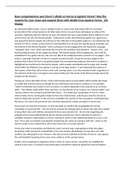How comprehensive was Cicero’s attack on Verres in Against Verres? Give the
reasons for your views and support them with details from Against Verres. (20
Marks)
An extremely skilled orator, Cicero’s political career in many ways took shape after his successful
prosecution of the corrupt governor of Sicily Gaius Verres. He used many techniques to achieve this
outcome, beginning with the rhetoric he uses. He employs the use of apostrophe (direct address) to not
only the jury, but also the Roman people- “endeavours to plot simultaneously against me, against you,
and against the Roman people. By referring to the collective of all possible audiences, he emphasizes the
severity of Verres’ crimes, as they have far reaching effects on not just one specific group of people, but
the entirety of the Roman Republic. Other techniques include exaggerative and hyperbolic language;
“damaged, fatal, crisis” which also boost the severity, the exordium (introduction); “a grave crisis”, and
finally putting pressure on the judges by stating “The Roman people will be judging you, and it will be
established if very guilty and very rich men are able to be condemned when senators act as judges”. This
quote is especially indicative of Cicero’s masterful oratorical skill- it traps the senator judges in the
position that if they find Verres not guilty (despite the overwhelming evidence) then their corruption is
highlighted and confirmed to the Roman people, which would undoubtedly lead to anger and, possibly
revolt within the Plebeian class against a corrupt unfair legal system- in turn deposing the senators of
their power, which they all fear due to their self- serving nature. Even the statement itself, regardless of
the outcome of the trial, is enough to sow seeds of distrust in the minds of the Roman people about the
integrity of the Senators.
Moving on, Cicero describes Verres’ crimes and transgressions in great detail, which creates the image
so vividly that it almost seems as though the jury themselves were there to witness it. For example;
“which he harassed and ruined to such an extent it is utterly impossible to be restored to its’ previous
state”, “the Sicilians held neither their own laws, nor the decrees of our senate, nor common rights” and
“Roman citizens were tortured and killed like slaves”. This meticulous recollection of Verres’ crimes
almost makes Verres sound guilty simply by the level of detail alone, and the jury would be forced to
take this detail into account. It also serves to embolden the severity of the accusations- treating Romans
like slaves, the rule of law perverted and criminals unpunished; simply corruption in every area.
Cicero does not stop there however- he also proceeds to mention the unspeakable acts Verres
committed in his private life- “I do not wish to increase the damage done to those men who were unable
to keep their wives and children untouched by that mans wanton lust”. By not only magnifying his
unlawful and corrupt political life but also his heinous private one, Cicero attempts to perform a
complete character assassination on Verres, leaving no room for any redeeming features to such a vile
man. This is also an example of praeteritio (mentioning his crimes by saying he will not)- crimes so vile
that he couldn’t even repeat them, which also shows him as morally superior.
Verres also tried to manipulate and delay the case in several ways- attempting to bribe the judges,
promoting a false prosecutor sympathetic to his case and also attempting to occupy the court with
another case, delaying his own. However, this only served to add fuel to the fire of Ciceros’ case against
him and backfired by giving Cicero even more evidence of his corrupt nature.
Finally, Cicero employed an ingenious tactic in order to ensure Verres’ conviction. He modified the
routine of the court; so instead of the prosecution and defence speeches going first and the evidence




